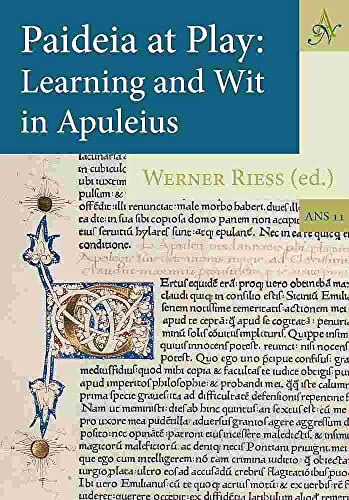RIESS, W , ED , (1 Ergebnisse)
Produktart
- Alle Produktarten
- Bücher (1)
- Magazine & Zeitschriften
- Comics
- Noten
- Kunst, Grafik & Poster
- Fotografien
- Karten
-
Manuskripte &
Papierantiquitäten
Zustand
- Alle
- Neu
- Antiquarisch/Gebraucht
Einband
- alle Einbände
- Hardcover
- Softcover
Weitere Eigenschaften
- Erstausgabe
- Signiert
- Schutzumschlag
- Angebotsfoto
Land des Verkäufers
Verkäuferbewertung
-
Paideia at Play: Learning and Wit in Apuleius.
Verlag: Barkhuis, 2008
ISBN 10: 9077922415ISBN 13: 9789077922415
Anbieter: Scrinium Classical Antiquity, Aalten, Niederlande
Buch
Zustand: Antiquarian. Barkhuis, Eelde, 2008. XXI,302p. Hardcover. The idea of education and learning (paideia) was central to ancient Greek thought. With the incorporation of the Greek East into the Roman Empire, the concept of paideia underwent profound changes and by the second century CE, the so-called age of the Second Sophistic, paideia embodied Greek civilization and culture. The Latin orator and author Apuleius of Madauros adapted the Greek concept of paideia and conveyed it to a Latin audience in his main works, the only extant Latin court speech of the Roman Empire (the Apology) and the only Latin novel that is completely preserved, the Metamorphoses. The contributors to this volume have undertaken the task of discerning the specific forms of paideia and its varying functions in both works. Interpreting these literary masterpieces from a literary and historical perspective as well as in close correlation to each other, the authors argue that a significant unifying factor characterizes both speech and nov el: the playful nature of Apuleius' paideia. The traditional literary technique of blending serious with comic elements reached new heights during the second century CE, since for authors of the Second Sophistic learning and wit were often intertwined. In Apuleius' writings in particular, reflexivity and entertainment go hand in hand, with paideia almost always bound up with wit and humor. This programmatic combination serving specifically Apuleian ends testifies to Apuleius' highly self-conscious and innovative treatment of Greek paideia. With contributions of (a.o.): St.J. Harrison, W. Riess, V. Hunink, M. Zimmermann, R.E. Vander Poppen, D.P.C. Carlisle. Antiquarian.


